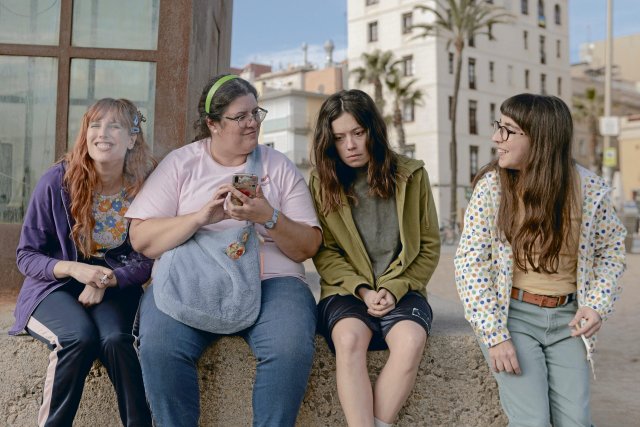Marga (Natalia de Molina, l.), Àngels (Coria Castillo, 2.vl), Nati (Anna Castillo, 2.vr) und Patri (Anna Marchessi, r.)
Photo: ZDF/Daniel Escale
It is well known that television likes fixed rules for the plot and personality of its fictions. In the ZDF melodrama, for example, the main actresses always drive funny cars, mostly pink convertibles, which their admirers, usually hands-on women-lovers, repair in the event of damage, as well as lonely hearts. After all, they have something that characters at the top of the cast list aside from Forrest Gump often have: physical and mental stability.
Anyone who lacks both is only suitable as a supporting character, whose existence complicates the consciousness of the flawless core characters. Characteristics apart from the cognitive deficit? None! A character like 36-year-old Ángels (Coria Castillo) appears on screen just as rarely as her two cousins Marga (Natalia de Molina) and Patri (Anna Marchessi) or her sister Nati (Anna Castillo). According to supervisor Laia, they are all “people with functional diversity.” Once popularly called “mentally ill” and medically “mentally retarded,” their place was for a long time on the dramaturgical fringes.
Luckily, the all-female film team leaves the search for answers to the protagonists.
–
In the Spanish series “Simple,” which runs in Germany on ZDF-Neo, they are now at the center of a tragicomedy with a sea view. Based on Cristina Morales’ bestseller »Lectura Fácil«, screenwriter Anna R. Costa quarters the unlikely quartet in a shared apartment on the beach in Barcelona. Their handicaps range from the low IQ of the flatmate leader Ángels to Nati’s aggressive autism. But none is so serious that it would deny those affected something unheard of: a self-determined life.
Under the supervision of Laia’s cost-conscious aid organization, they organize everyday life almost on their own. They have jobs, friends, stress, free time, even periods, sex and partners. While the control freak Patri is with the similarly disabled Enrique (Eloi Costa), Marga’s desire for freedom results in a form of promiscuity that runs counter to her incapacitation and constantly causes problems.
Because two swords of Damocles hang over the fragile freedom: one is held by the landlord, for whom the love of freedom of his stubborn customers is too sensitive. One thing is the state, which is apparently also suspected of losing control in Spain. Director Laura Jou turns this into something extraordinary: for five 35 minutes, she allows the special features of her four protagonists to float freely between plot-relevant and irrelevant.
This not only raises questions about how to deal with deviations from social norms, but even more so, what is that supposed to be – normal? Doesn’t the naivety of the roommate’s cashier, who has difficulty learning, deviate far less from this than the behavior of her aunt, who takes advantage of Ángel’s good faith to pocket her bingo winnings? And does Marga’s lust-driven sexuality really contradict common morality more than a social welfare worker who therefore pressures her to undergo sterilization?
Luckily, the all-female film team leaves the search for answers to the protagonists – who, with the exception of Anna Marchessi as Patri, are played by actresses without physical and mental limitations. In this way, »Simple« avoids the false paternalism of wanting to protect its characters from themselves and, in doing so, gives them the freedom they need to find a fragile but heartwarming balance between refreshing naivety and painful self-awareness.
“Unfortunately, I’m a bit behind,” says Marga after a night of partying with different sexual partners. “Things like that happen.” And the way she expresses this in the dubbed version, both happily and sadly, sounds much more stereotypically disabled than the original version. But even in German it becomes clear what this is about: a partisan inventory of civil society integration processes that feel like segregation even on the sunny coast of Spain. In the fixed television rules, despite the dome show “Particularly Popular,” in which disabled people have been dating on Vox based on the US model (“The Undatables”) since 2021, this is still progress.
Since ARD made a “Mongoloid problem child” a series character with “Our Walter” in 1974, there have been more people with functional diversity; But when Bobby Brederlow’s Down Syndrome shrank into a partial aspect of his films 25 years later, three handicaps became fully screen-ready: wheelchairs like in the ZDF multi-part series “Anna”. Tics like in “Vincent wants sea”. Or the short Tyrion in “Game of Thrones”. All autonomous male personalities. The fact that “Simple” turns mentally disabled women from objects into subjects is a quantum leap. And that’s not all: great television.
Available in the ZDF media library
Subscribe to the “nd”
Being left is complicated.
We keep track!
With our digital promotional subscription you can read all issues of »nd« digitally (nd.App or nd.Epaper) for little money at home or on the go.
Subscribe now!
